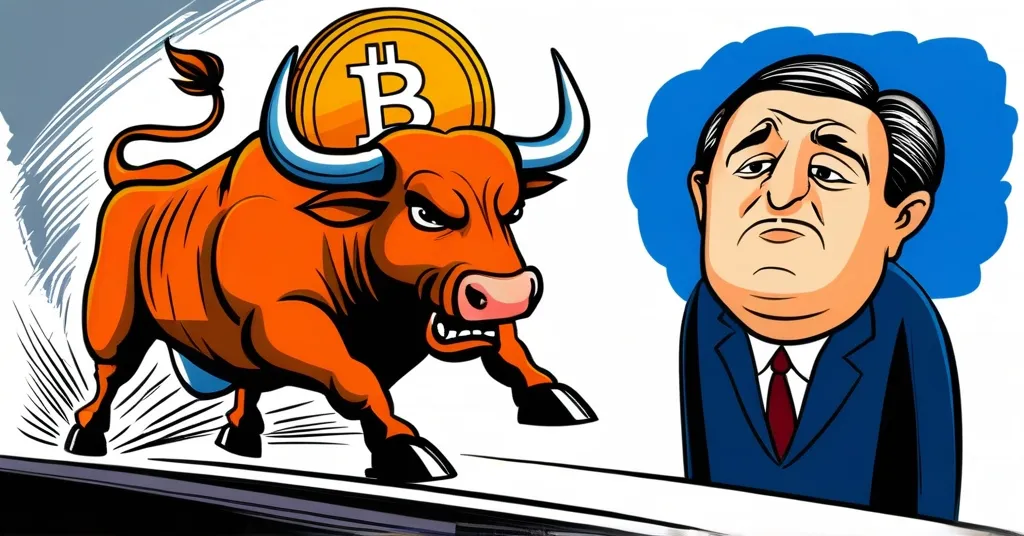Trump’s Crypto Influence Soars Bitcoin, Sparks Regulatory Debate

Bitcoin Soars: Analyzing Trump’s Influence and Regulatory Challenges in the Cryptocurrency Market
At the recent World Economic Forum in Davos, the future of cryptocurrencies sparked intense debate. South Africa’s central bank governor, Lesetja Kganyago, questioned bitcoin’s value as a reserve asset, while Donald Trump’s influence propelled the market to new heights. This clash of perspectives underscores the ongoing tug-of-war between skepticism and enthusiasm within the global financial landscape.
- South Africa’s central bank governor criticizes bitcoin as a reserve asset.
- Trump’s influence drives bitcoin to new highs.
- Crypto industry’s lobbying efforts raise concerns about regulatory capture.
- Trump’s memecoin launch sparks ethical debates.
Lesetja Kganyago, the governor of the South African Reserve Bank, made headlines at Davos by likening the idea of holding bitcoin in reserves to stockpiling beef or apples. “I have a significant problem with a lobby that says governments should hold this asset or that asset,” Kganyago stated. “There is a history to gold. There was once a gold standard… If we now say ok, bitcoins. What about platinum? What about coal? Why don’t we hold strategic beef reserves, or mutton reserves, or apple reserves? Why Bitcoin? There’s nothing special about it.” His skepticism challenges the notion of cryptocurrencies as stable, valuable assets, highlighting their volatility and lack of intrinsic value.
In stark contrast, Donald Trump’s pro-crypto stance has been a driving force behind bitcoin’s recent surge. Following Trump’s election and his declaration as the “crypto president,” bitcoin reached an all-time high near $110,000. Coinbase CEO Brian Armstrong, speaking at Davos, acknowledged this impact: “The Trump effect cannot be denied here. To have the leader of the largest GDP country in the world come out undeniably and say that he wants to be the first crypto president… This is unprecedented.” Armstrong’s comments reflect the crypto industry’s enthusiasm for Trump’s supportive stance, which has undoubtedly propelled cryptocurrencies into the mainstream.
However, this enthusiasm has not come without controversy. The crypto industry’s lobbying efforts, which have seen leaders like Armstrong spend $119 million to influence pro-crypto US lawmakers, have raised concerns about “regulatory capture.” This term refers to a situation where regulatory agencies, intended to act in the public interest, instead advance the commercial or special interest groups that dominate the industry they regulate. Kganyago warned that such efforts might prioritize industry profits over fairness, potentially undermining global regulatory efforts. This raises a critical question: should the crypto industry’s influence on policy-making be celebrated as a victory for innovation, or feared as a threat to equitable regulation?
Adding fuel to the fire, Trump recently launched his own memecoin, with his firm owning 80% of the total supply. This move has sparked ethical concerns, with Nic Carter, a Trump supporter and founding partner at Castle Island Ventures, calling it “absolutely preposterous” and “plumbing new depths of idiocy.” Democrat Rep. Sean Casten went further, accusing Trump of trying to enrich himself at the expense of his supporters: “He continues to make clear he will not let detriments to his supporters or ethics stand in the way of enriching himself.”
The Trump family’s involvement in the crypto space extends beyond the memecoin, with Trump’s sons launching World Liberty Financial, a family crypto venture. Meanwhile, US lawmakers are forming subcommittees and working groups focused on digital assets, aiming to protect crypto firms from enforcement actions. This blurring of lines between industry influence and regulatory oversight further complicates the landscape, as the industry navigates the fine line between innovation and potential abuse.
As the crypto industry continues to evolve, the balance between innovation and regulation remains precarious. The “Trump effect” has undoubtedly propelled cryptocurrencies into the mainstream, but the ethical and regulatory challenges it poses cannot be ignored. The industry must tread carefully to maintain its integrity and credibility in the face of such powerful influences. While Trump’s support has driven adoption and interest, it also brings scrutiny and calls for responsible growth that respects the principles of decentralization, privacy, and fairness.
Key Takeaways and Questions
- What is the “Trump effect” on cryptocurrency?
The “Trump effect” refers to the significant influence Donald Trump’s pro-crypto stance had on the market, driving bitcoin prices to an all-time high near $110,000 following his election.
- Why does Lesetja Kganyago compare holding bitcoin in reserves to stockpiling beef or apples?
Kganyago compares bitcoin to beef or apples to highlight what he perceives as the absurdity of holding bitcoin as a reserve asset, questioning its intrinsic value and stability.
- How do crypto industry leaders justify their lobbying efforts?
Crypto industry leaders like Brian Armstrong justify their lobbying efforts as a necessary part of engaging with policymakers in a democratic process, similar to how other industries, such as Wall Street, operate.
- What ethical concerns arise from Trump’s memecoin launch?
Ethical concerns arise from the fact that 80% of the memecoin’s total supply is owned by Trump’s firm, raising questions about potential conflicts of interest and the risk of financial loss for investors.
- What is the potential impact of the “Trump effect” on global crypto regulations?
The “Trump effect” could lead to “regulatory capture,” where regulations are shaped by industry profits rather than fairness, as warned by Kganyago, potentially undermining global efforts to regulate cryptocurrencies effectively.



